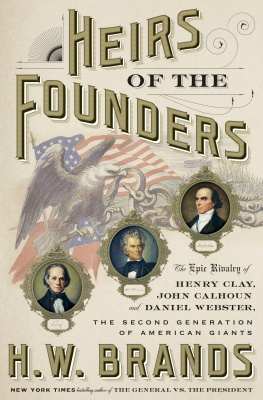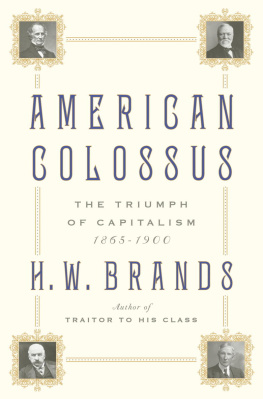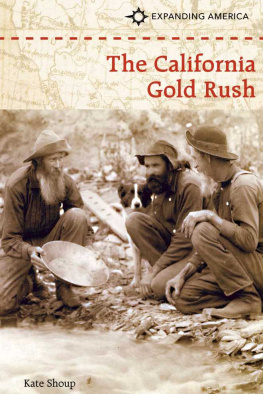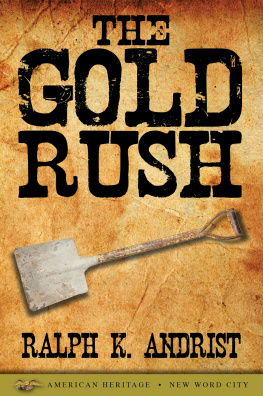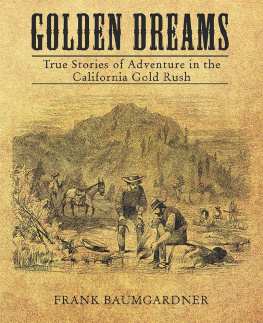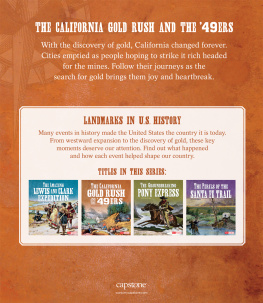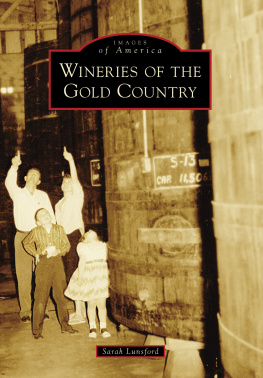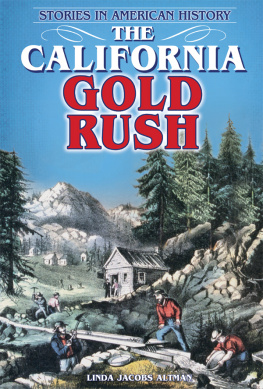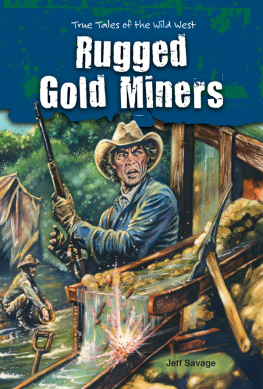THE AGE & GOLD
Acclaim for H. W. Brands
[H. W. Brands] will change the way you see history. The Age of Gold brilliantly pans the historical record for nuggets of hardship and, in the process, hits upon a mother lode of a story.
Austin American-Statesman
Gripping. Thoroughly researched. An eminently readable, detailfilled book.
Chicago Tribune
A serious, comprehensive study, filled with memorable visions and interesting observations. A book that explores history, politics, geology, adventure and industry with omnibus enthusiasm. Its author, like the miners of the gold rush themselves, leaves no stone unturned.
The San Diego Union-Tribune
A fine, robust telling of one of the greatest adventure stories in history.
David McCullough, Pulitzer Prize-winning author of John Adams
Brands assembles a colorful collection of people swept into this craze from around the world in[to] a dazzling setting that conveys the worldchanging effects of this era. [He is a] master storyteller.
The Christian Science Monitor
Few historians can tell a tale better than Brands.
The Dallas Morning News
Populated with colorful California characters. Brands makes a convincing case that the discovery of gold was a seminal event in American history.
Boston Herald
Fascinating. Brands brings the era and its characters to life in a remarkably entertaining narrative that is meticulously researched and crisply written. The Age of Gold is historical reporting at its best.
Arizona Daily Star
H. W. Brands
H. W. Brands is Distinguished Professor and Melbern G. Glasscock Chair of American History at Texas A&M University. He is the author of many books, among them The First American: The Life and Times of Benjamin Franklin, which was a finalist for the Pulitzer Prize and the Los Angeles Times Book Prize, and T. R.: The Last Romantic, a critically acclaimed biography of Theodore Roosevelt. He lives in Austin, Texas.
Also by H. W. Brands
The Strange Death of American Liberalism
The First American: The Life and Times of Benjamin Franklin
The Selected Letters of Theodore Roosevelt (editor)
Critical Reflections on the Cold War: Linking Rhetoric and History (editor, with Martin J. Medhurst)
The Use of Force After the Cold War (editor)
Beyond Vietnam: The Foreign Policies of Lyndon Johnson (editor)
Masters of Enterprise: Giants of American Business from John Jacob Astor and J. P. Morgan to Bill Gates and Oprah Winfrey
What America Owes the World: The Struggle for the Soul of Foreign Policy
T.R.: The Last Romantic
Since Vietnam: The United States in World Affairs, 19731995
The Wages of Globalism: Lyndon Johnson and the Limits of American Power
The Reckless Decade: America in the 1890s
The United States in the World: A History of American Foreign Policy
Into the Labyrinth: The United States and the Middle East, 19451993
The Devil We Knew: Americans and the Cold War
Bound to Empire: The United States and the Philippines
Inside the Cold War: Loy Henderson and the Rise of the American Empire, 19181961
India and the United States: The Cold Peace
The Specter of Neutralism: The United States and the Emergence of the Third World, 19471960
Cold Warriors: Eisenhowers Generation and American Foreign Policy
ALSO BY
H. W. BRANDS
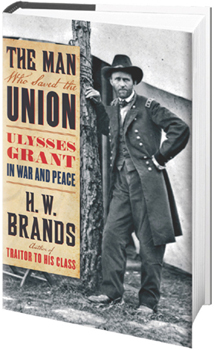
A masterful biography of the Civil War general and two-term president who saved the Union twiceon the battlefield and in the White House.
Once again, H.W. Brands has crafted a wonderful portrait of a great leader who endured and prevailed in hours of stress and strain. Brandss U.S. Grant is a compelling figure, a man too often overlooked by history. This book rectifies that with grace and insight.J ON M EACHAM , author of American Lion, winner of the Pulitzer Prize for biography
There is a magnificent unity to this story of Grants leadership in both war and peace that is not found anywhere else. In this compelling narrative, Grant emerges more fascinating than ever before.D ORIS K EARNS G OODWIN , author of Team of Rivals and No Ordinary Time, winner of the Pulitzer Prize for history
www.doubleday.com

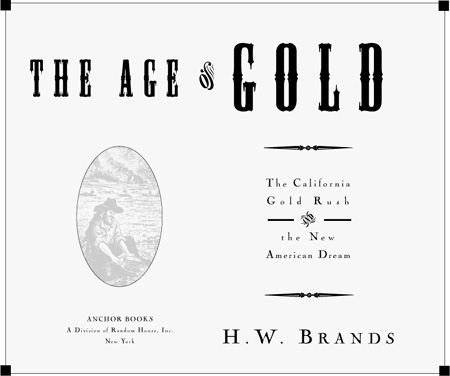
Contents
Prologue: The Baron and the Carpenter
(Coloma: January 1848)
PART ONE
The Gathering of Peoples
(From the World to California: 18481849)
PART TWO
From Vulcans Forge
(The Goldfields: 18481850s)
PART THREE
American Athena
(California: 18491856)
PART FOUR
The Gordian Knot and the Pacific Connection
(California and the Union: 18561869)
PART FIVE
The New El Dorado
(America in the Age of Gold)
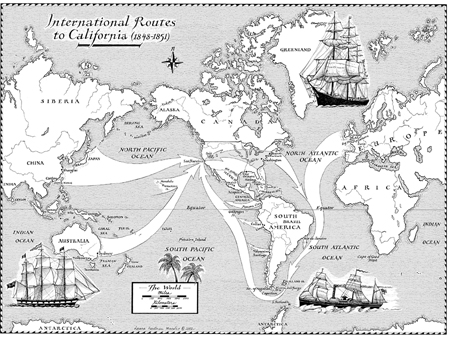
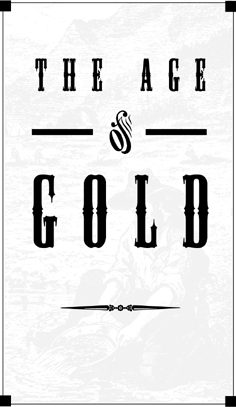
Prologue
The Baron and the Carpenter
(Coloma: January 1848)
In the wilderness a man made do. Given any choice in the matter, James Marshall wouldnt have retained Jennie Wimmer as cook and housekeeper for his construction gang. She was stubborn, surly, belligerently unimaginative in the kitchenand fully aware she couldnt be replaced. She cooked what she wanted, when she wanted. She served the best portions to her husband, Peter, and their seven children. The hired hands, who bunked in the opposite end of the double log cabin that sheltered the Wimmers, were left with the toughest beef, the stringiest mutton, the stalest peas, the driest biscuits, and without the pumpkin and apple pies that varied, ever so slightly, the monotonous diet. Meals were served at Jennies whim, yet she grew furious if the men werent seated and ready when she deigned to deliver the food.
The men chafed under her arbitrary rule during the late autumn of 1847; their annoyance reached rebellion on Christmas Day, when Marshall happened to be down the river at Sutters Fort. Most of the men were Mormons, devout Christians after their Latter-day fashion, and they desired to savor their holiday and honor their Lords birth by grooming themselves more fastidiously than the normal work schedule allowed. But Jennie Wimmer would brook no change from her routine. She rang the bell, and when they didnt appear at once, she vowed they could feed themselves.
Henry Bigler was an elder of the Mormon Church and a military veteran; he had survived the anti-Mormon pogroms in Missouri and Illinois, and fought Mexicans in the war not quite officially ended. He had suffered Jennie Wimmertill now. On Christmas morning just at daylight we was called to breakfast, he recorded. We was washing our faces. We was called the second time before we was ready to obey. She told us plainly that she was Boss and that we must come at the first call, which we had always had done before. This we did not like, and we revolted from under her government.


